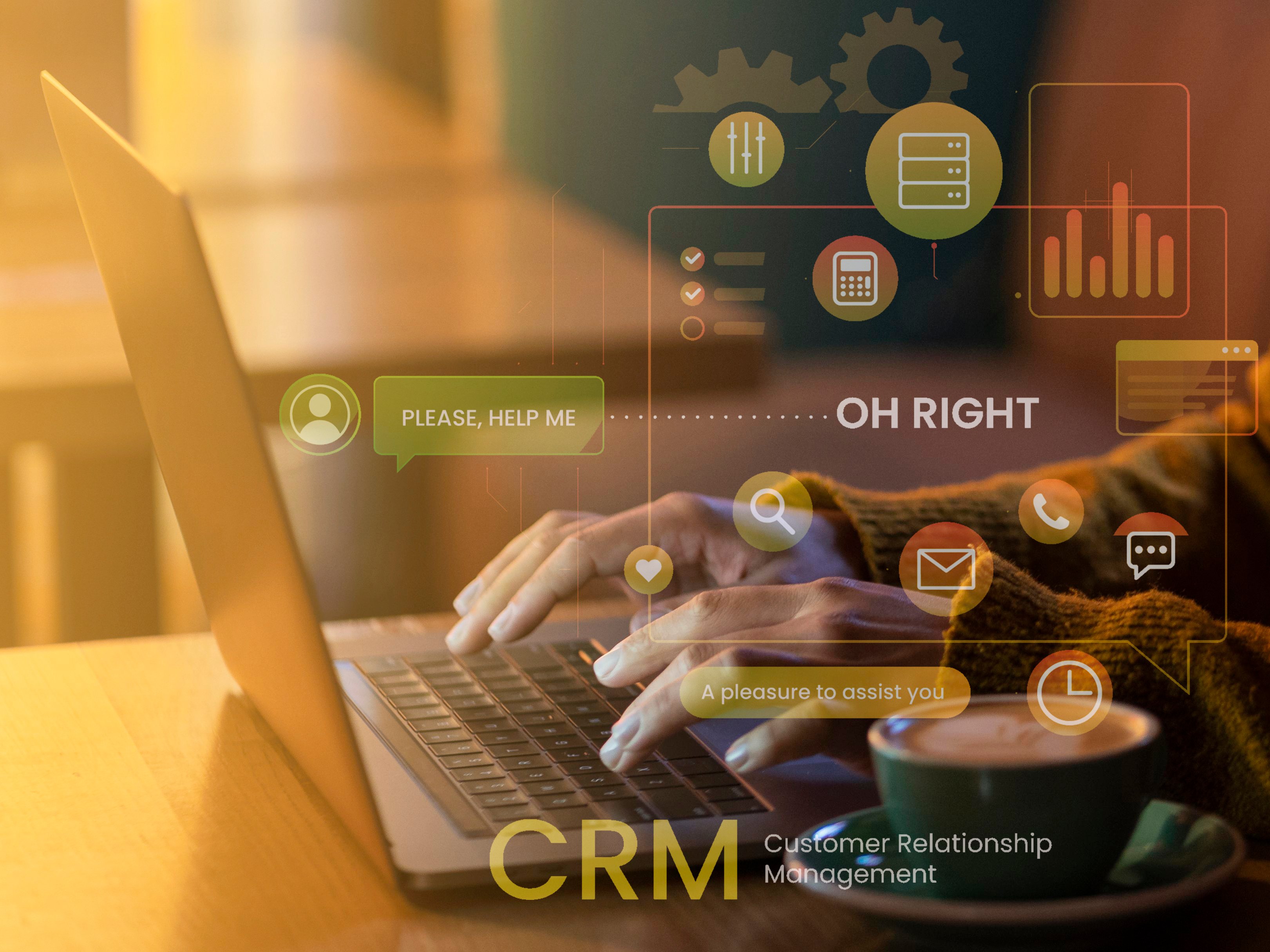Discover the best AI-powered CRM platforms to transform your customer relationships. Leverage intelligent automation, predictive insights, and generative AI to boost sales, marketing, and service efficiency.
Artificial Intelligence has evolved from a futuristic concept to a business necessity. According to recent industry research, organizations leveraging AI in their CRM systems are experiencing significant increases in productivity, conversion rates, and deal sizes. As customer expectations continue to rise and competition intensifies, businesses need intelligent tools that can analyze data, predict outcomes, and automate complex workflows in real time.
This is where AI-based CRM software becomes a game-changer. By integrating machine learning, generative AI, and predictive analytics into customer relationship management, these platforms enable businesses to work smarter, engage customers more effectively, and drive sustainable revenue growth. In this comprehensive guide, we'll explore why AI CRM matters, what features to prioritize, and review the top five AI CRM systems transforming business operations in 2025.
Leading AI CRM Platform
Creatio
Creatio is an agentic CRM platform that unifies sales, marketing, and service operations on a powerful no-code foundation. It combines Generative, Predictive, and Agentic AI capabilities to automate the entire customer journey and significantly boost team productivity.
With advanced AI agents, intelligent automation, and composable architecture, Creatio empowers businesses to customize workflows at scale without writing code. Its transparent pricing includes all AI features at no additional cost, making enterprise-level intelligence accessible to organizations of any size.
Why AI CRM Software is Essential for Modern Businesses
Automating Repetitive Tasks to Focus on What Matters
One of the biggest productivity drains in sales and marketing teams is the time spent on repetitive, manual tasks. AI CRM software eliminates these bottlenecks by automating activities like data entry, lead scoring, email follow-ups, and meeting scheduling. Instead of spending hours qualifying leads or updating contact records, your team can focus on high-value activities like building relationships and closing deals. With AI handling the routine work, businesses can operate more efficiently and respond faster to customer needs.
Delivering Personalized Customer Experiences at Scale
Today's customers expect personalized interactions at every touchpoint. AI-powered CRM systems analyze vast amounts of customer data—including browsing behavior, purchase history, and engagement patterns—to deliver tailored recommendations and communications. Whether it's suggesting the perfect product, crafting personalized email campaigns, or identifying the best time to reach out, AI ensures every customer interaction feels relevant and timely. This level of personalization drives higher engagement rates, increased conversions, and stronger customer loyalty.
Making Smarter Decisions with Predictive Analytics
Traditional CRM systems show you what happened in the past. AI CRM tells you what's likely to happen in the future. By analyzing historical data, market trends, and customer behavior patterns, AI-powered platforms provide predictive insights that inform strategic decisions. Sales teams can identify which deals are most likely to close, marketing teams can predict campaign performance, and customer service teams can proactively address potential churn risks. These data-driven insights eliminate guesswork and enable businesses to allocate resources more effectively.
Enhancing Sales Forecasting Accuracy
Accurate sales forecasting is critical for business planning and resource allocation. AI CRM systems leverage machine learning algorithms to analyze multiple variables—deal velocity, customer engagement, historical win rates, and market conditions—to generate highly accurate revenue forecasts. Unlike traditional methods that rely on gut feelings or simple calculations, AI models continuously learn from new data and adapt to changing patterns. This improved accuracy helps leadership teams make confident decisions about hiring, inventory, and growth strategies.
Improving Customer Service and Response Times
Customer service can make or break your business reputation. AI-powered CRM platforms enhance service delivery through intelligent chatbots, automated case routing, and sentiment analysis. AI chatbots handle routine inquiries 24/7, providing instant responses and freeing up human agents for complex issues. Smart case routing ensures customer problems reach the right specialist quickly, while sentiment analysis helps teams prioritize urgent cases and respond with appropriate empathy. The result is faster resolution times, higher customer satisfaction, and reduced service costs.
Scaling Operations Without Increasing Headcount
As businesses grow, managing customer relationships manually becomes increasingly complex and costly. CRM with AI software provides the scalability needed to handle growing data volumes, expanding customer bases, and more sophisticated workflows without proportional increases in staff. Automation handles tasks that would otherwise require additional hires, while AI-driven insights help existing teams work more efficiently. This scalability ensures businesses can maintain service quality and operational efficiency even during rapid growth phases.
Top 5 AI CRM Systems
1. Creatio

Creatio stands out as the most comprehensive agentic CRM platform available today. Unlike competitors that bolt AI features onto existing systems, Creatio was built from the ground up with AI embedded throughout its architecture. This fundamental difference means AI is aware of all data objects, relationships, workflows, and business processes, enabling seamless intelligent automation across every function.
The platform combines three powerful products—Marketing Creatio, Sales Creatio, and Service Creatio—all unified on the Studio Creatio no-code platform. This integration ensures teams across your organization work from a single source of truth while maintaining the flexibility to customize workflows for their specific needs.
What truly sets Creatio apart is its combination of Generative, Predictive, and Agentic AI. The platform offers pre-built AI agents for sales, marketing, and service that can handle complex tasks autonomously. For example, AI agents can conduct account research, generate personalized quotes, nurture leads through multi-channel campaigns, and optimize knowledge base articles—all without human intervention.
For businesses requiring unique solutions, Creatio's AI-assisted no-code environment enables any user to create custom AI agents tailored to their workflows. The visual Agent Builder lets you compose skills, workflows, and knowledge sources without technical expertise, while the AI Command Center provides centralized governance and monitoring of all AI activities.
Perhaps most importantly, Creatio makes enterprise-grade AI accessible to businesses of all sizes. All AI capabilities—including Generative, Predictive, and Agentic AI—are included in every subscription plan at no additional cost. This transparent pricing model means you can leverage cutting-edge AI without budget surprises or feature limitations.
Pros:
- AI-native architecture with intelligence embedded throughout the platform
- Complete suite of pre-built AI agents for sales, marketing, and service
- No-code Agent Builder for creating custom AI solutions without technical skills
- Unified platform eliminates data silos and ensures cross-functional alignment
- All AI features are included at no extra cost, regardless of subscription tier
- Industry-specific solutions for 20+ sectors with 700+ marketplace integrations
- Composable architecture allows businesses to pay only for the needed functionality
Cons:
- Initial learning curve for users new to no-code development concepts
- Extensive customization options may require time to explore and implement fully
Pricing:
- Growth: starts at $25/user/month
- Enterprise: starts at $55/user/month
- Unlimited: starts at $85/user/month
- Individual CRM products (Sales, Marketing, Service): $15/user/month each
- All plans include full AI capabilities at no additional charge
- 14-day free trial available
2. HubSpot CRM

HubSpot has established itself as a popular choice for businesses seeking an integrated approach to marketing, sales, and customer service. The platform's modular hub structure allows companies to start with specific functionalities and expand as needs evolve, making it particularly appealing to growing organizations.
At the heart of HubSpot's AI offering is Breeze Copilot, an intelligent assistant that provides data-driven insights on demand. Marketing teams can leverage generative AI to create content for campaigns, while sales representatives use AI-powered tools to draft personalized outreach emails based on prospect data. The ChatSpot feature offers real-time customer insights and support, helping service teams respond quickly to inquiries.
HubSpot's strength lies in its user-friendly interface and comprehensive educational resources through HubSpot Academy. The platform works well for small to mid-sized businesses with relatively straightforward CRM needs who value ease of use and quick deployment. The free tier offers basic CRM functionality, allowing businesses to test the platform before committing to paid plans.
However, businesses should carefully consider the total cost of ownership. Advanced AI features, including AI agents and sophisticated content generation capabilities, require premium plans starting at $1,300 per month. Additionally, the Breeze AI functionality costs an extra $50 monthly on top of your subscription, which can significantly increase expenses for larger teams.
Pros:
- Intuitive, easy-to-navigate interface suitable for non-technical users
- Comprehensive free tier for basic CRM functionality
- Breeze Copilot provides AI-driven insights and recommendations
- Strong educational resources through HubSpot Academy
- Generative AI for content creation across marketing channels
- Seamless integration between marketing, sales, and service hubs
Cons:
- Premium AI features require expensive enterprise-level plans
- AI capabilities cost an additional $50/month per user
- Limited customization compared to more flexible platforms
- Pricing can escalate quickly as team size and feature needs grow
Pricing:
- Free Tools: basic CRM with limited AI
- Premium plans: starting at $1,300/month
- Breeze AI add-on: $50/month per user
- AI agents available only in premium tiers
3. Zoho CRM

Zoho CRM delivers a comprehensive suite of customer relationship management tools enhanced by Zia, its AI-powered virtual assistant. Designed for small and midsize B2B and B2C organizations, Zoho offers an affordable entry point into AI-driven CRM with features spanning sales, marketing, customer service, and analytics.
Zia serves as an intelligent assistant that helps teams work more efficiently. It can collect and organize customer data automatically, draft emails and documents, and provide real-time sales analytics. The AI assistant uses pattern recognition to suggest workflow automations based on your team's activities, continuously learning from your processes to recommend improvements.
One of Zoho's standout AI features is its ability to enrich customer data through automated research. Zia can find and add missing information like job titles, contact details, and company information, ensuring your database remains accurate and complete. For e-commerce businesses, the AI provides intelligent cross-selling recommendations and personalized product suggestions based on customer behavior patterns.
Zoho's pricing structure makes it accessible to budget-conscious businesses, with plans starting at $20 per user monthly. However, companies should note that advanced AI features, including predictive analytics and sophisticated automation, are only available in the higher-tier Enterprise ($50) and Ultimate ($65) plans. While Zoho offers strong value for its price point, businesses may find its integration ecosystem more limited compared to larger competitors.
Pros:
- Affordable pricing makes AI CRM accessible to smaller businesses
- Zia AI assistant automates data collection and email drafting
- Pattern recognition suggests useful workflow automations
- Automated customer research enriches contact databases
- AI-driven product recommendations for e-commerce applications
- Comprehensive suite includes sales, marketing, and service tools
Cons:
- Advanced AI features restricted to expensive Enterprise and Ultimate plans
- More limited integration options compared to larger CRM vendors
- Predictive analytics capabilities not as sophisticated as premium alternatives
- Interface can feel less modern compared to newer platforms
Pricing:
- Standard: $20/user/month
- Professional: $35/user/month
- Enterprise: $50/user/month (includes AI predictive features)
- Ultimate: $65/user/month (full AI analytics)
4. Freshworks
Freshworks offers a unified CRM suite comprising Freshmarketer, Freshsales, Freshdesk, and Freshchat, providing end-to-end solutions for marketing, sales, customer service, and engagement. The platform emphasizes ease of deployment and user-friendliness, making it particularly attractive to teams seeking quick implementation without extensive training.
The centerpiece of Freshworks' AI offering is Freddy AI, which provides three distinct capabilities: Self-Service, Copilot, and Insights. Freddy Self-Service powers intelligent chatbots that handle customer support inquiries autonomously, routing complex issues to human agents when necessary. Freddy Copilot allows users to automate tasks through conversational language commands, requiring no technical expertise or coding knowledge.
Freddy Insights delivers real-time analysis and visualization of customer data, helping teams identify trends, opportunities, and potential issues. The platform's rule-based process guidance offers next-best-action recommendations that help sales representatives navigate complex deals more effectively.
While Freshworks excels at providing straightforward, easy-to-use AI tools, the platform supports a more limited set of prepackaged AI scenarios compared to enterprise-grade alternatives. The reporting and dashboarding capabilities, while functional, are relatively basic. Additionally, AI features come at an extra cost beyond the standard subscription—specifically, Freddy AI is charged at $100 per 1,000 sessions, which can add up for high-volume operations.
Pros:
- Exceptionally user-friendly interface with quick deployment
- Freddy Copilot enables task automation through simple conversational commands
- AI-powered chatbots provide effective customer self-service
- Real-time customer data analysis and visualization
- Rule-based guidance helps sales teams with next-best actions
- Unified suite covers marketing, sales, service, and chat
Cons:
- More limited AI scenarios compared to comprehensive platforms
- Additional charges for Freddy AI sessions beyond the subscription
- Basic reporting and dashboarding capabilities
- Fewer integration options than larger competitors
- Advanced AI customization options are limited
Pricing:
- Growth: $35/user/month
- Pro: $83/user/month
- Enterprise: $131/user/month
- Freddy AI: additional $100 per 1,000 sessions
5. Zendesk

Zendesk has built its reputation as a customer service powerhouse, offering CRM solutions specifically designed for service-oriented businesses and sales teams that prioritize customer experience. The platform excels at managing high volumes of customer interactions through sophisticated automation and AI-powered tools.
Built on OpenAI's GPT model, Zendesk AI streamlines workflows and automates repetitive service tasks, allowing customer service representatives to focus on complex, high-value interactions. The platform's advanced AI bots can handle sophisticated customer requests and generate personalized responses that feel natural and empathetic. Unlike basic chatbots that follow rigid scripts, Zendesk's AI understands context and adapts its communication style to match customer sentiment.
AI-driven performance insights help managers optimize operations by identifying bottlenecks, tracking resolution times, and highlighting areas for improvement. The intelligent case routing system ensures customer inquiries reach the most qualified agent based on expertise, availability, and issue complexity, reducing resolution times and improving first-contact success rates.
For businesses seeking additional AI capabilities, Zendesk supports ChatGPT integration through Zapier, expanding the platform's intelligence features. However, the separate systems for managing tickets and workflows can create a somewhat cumbersome user experience. The platform also imposes restrictions on chatbot complexity, limiting the number of steps in automated conversation flows.
Pros:
- Advanced AI bots handle complex customer service requests effectively
- Generates personalized, contextually appropriate responses
- AI-driven performance insights optimize service operations
- Intelligent case routing improves resolution efficiency
- ChatGPT integration available for extended AI capabilities
- Strong focus on customer service makes it ideal for support-heavy businesses
Cons:
- Separate ticket and workflow systems create navigation complexity
- Restrictions on chatbot conversation flow depth
- AI add-ons significantly increase costs ($50/user/month extra)
- Less emphasis on sales and marketing AI compared to service features
- Can be overly complex for businesses with simpler service needs
Pricing:
- Suite Team: $69/user/month (includes basic AI agents)
- Suite Growth: $115/user/month
- Suite Professional: $149/user/month
- Advanced AI features: additional $50/user/month
How to Choose the Right AI CRM for Your Business
Evaluate Your Primary Use Cases
Before selecting a CRM with AI, clearly define what problems you're trying to solve. Are you primarily focused on sales automation, marketing campaign optimization, customer service enhancement, or comprehensive revenue operations? Different platforms excel in different areas. For example, if customer service is your priority, platforms with advanced AI chatbots and case routing should rank higher. If you need end-to-end automation across sales, marketing, and service, look for unified platforms that provide AI capabilities across all functions.
Consider Customization and Scalability
Your business is unique, and your CRM should adapt to your specific workflows rather than forcing you to change how you work. Platforms with no-code customization tools enable you to tailor processes without requiring developer resources. Additionally, consider your growth trajectory. Can the platform scale as your team grows, data volumes increase, and processes become more sophisticated? Look for solutions with composable architectures that allow you to add functionality as needs evolve without replacing your entire system.
Assess AI Transparency and Control
Not all AI implementations are created equal. Some platforms use AI as a "black box" where you can't understand how decisions are made or maintain proper governance. Look for solutions that provide transparent AI operations with clear visibility into how models work, what data they use, and what actions they recommend. Robust governance tools should allow you to set permissions, monitor AI activities, and maintain control over automated processes to ensure compliance and security.
Calculate Total Cost of Ownership
Pricing transparency matters significantly when evaluating AI CRM options. Some vendors advertise attractive base prices but charge substantial extra fees for AI features, additional users, or advanced capabilities. Calculate the true total cost by considering your subscription tier, add-on costs for AI functionality, implementation expenses, training requirements, and ongoing maintenance. Platforms like Creatio that include all AI features at no extra cost often provide better value than solutions with attractive entry prices but expensive upgrades.
Review Integration Capabilities
Your CRM won't operate in isolation. It needs to connect with your existing technology stack, including email platforms, marketing automation tools, accounting software, and industry-specific applications. Evaluate each platform's integration ecosystem and the availability of pre-built connectors. Also consider whether the platform offers open APIs for custom integrations if you have unique requirements. Strong integration capabilities ensure data flows seamlessly across your business ecosystem.
Test User Experience and Adoption Likelihood
Even the most powerful AI-based CRM is worthless if your team won't use it. During evaluation, involve actual users from different departments to test the interface, workflows, and AI features. Is the platform intuitive? Can team members accomplish tasks without extensive training? Does the AI genuinely help or create more work? User adoption is critical for CRM success, so prioritize platforms that balance powerful capabilities with usability.
Key AI CRM Features to Look For
AI-Powered Lead Scoring and Qualification
Automatically prioritize prospects based on conversion likelihood, engagement patterns, and historical data. Advanced lead scoring saves sales teams countless hours by identifying which opportunities deserve immediate attention.
Generative AI for Content Creation
Create personalized emails, marketing copy, sales proposals, and customer communications in seconds. Generative AI maintains your brand voice while adapting content to specific audiences and contexts.
Predictive Analytics and Forecasting
Leverage machine learning to predict sales outcomes, customer churn risks, and revenue trends with high accuracy. Predictive capabilities transform your CRM from a record-keeping tool into a strategic planning asset.
Intelligent Automation and Workflows
Build sophisticated automation sequences that adapt based on customer behavior and AI recommendations. Smart workflows eliminate manual task management while ensuring timely, relevant customer interactions.
Conversation Intelligence and Sentiment Analysis
Analyze customer communications across calls, emails, and chats to understand sentiment, identify objections, and recommend optimal responses. Conversation intelligence helps teams communicate more effectively and empathetically.
AI Agents and Virtual Assistants
Deploy autonomous AI agents that can handle complex tasks like account research, meeting preparation, campaign execution, and knowledge base management without human oversight.
Real-Time Data Insights and Recommendations
Access instant analytics dashboards with AI-driven insights that highlight trends, anomalies, and opportunities. Real-time intelligence enables agile decision-making and rapid response to changing conditions.
To Sum Up
The AI CRM landscape in 2025 offers unprecedented opportunities for businesses to transform customer relationships, automate complex processes, and drive sustainable growth. Each platform reviewed in this guide brings unique strengths: Creatio CRM leads with its AI-native architecture and transparent pricing that includes all AI features, HubSpot excels in ease of use and integrated hubs, Zoho provides budget-friendly AI capabilities for smaller businesses, Freshworks delivers user-friendly rapid deployment, and Zendesk dominates customer service excellence.
Choosing the right AI CRM requires careful consideration of your unique business needs, growth trajectory, and budget constraints. Prioritize platforms that offer transparent pricing, robust customization capabilities, and AI features that address your specific challenges. Consider whether you need comprehensive customization or simplicity, whether AI costs should be transparent or tiered, and whether you require unified cross-functional capabilities or specialized excellence in one area.
As AI technology continues to evolve rapidly, selecting a vendor committed to ongoing innovation ensures your CRM investment remains valuable for years to come. Whether you're a small business taking your first steps into AI-powered customer management or an enterprise seeking to optimize sophisticated operations, the platforms reviewed in this guide provide strong foundations for success. By aligning these factors with your business goals, you can select an AI CRM that not only meets today's needs but scales effectively as your organization evolves.






